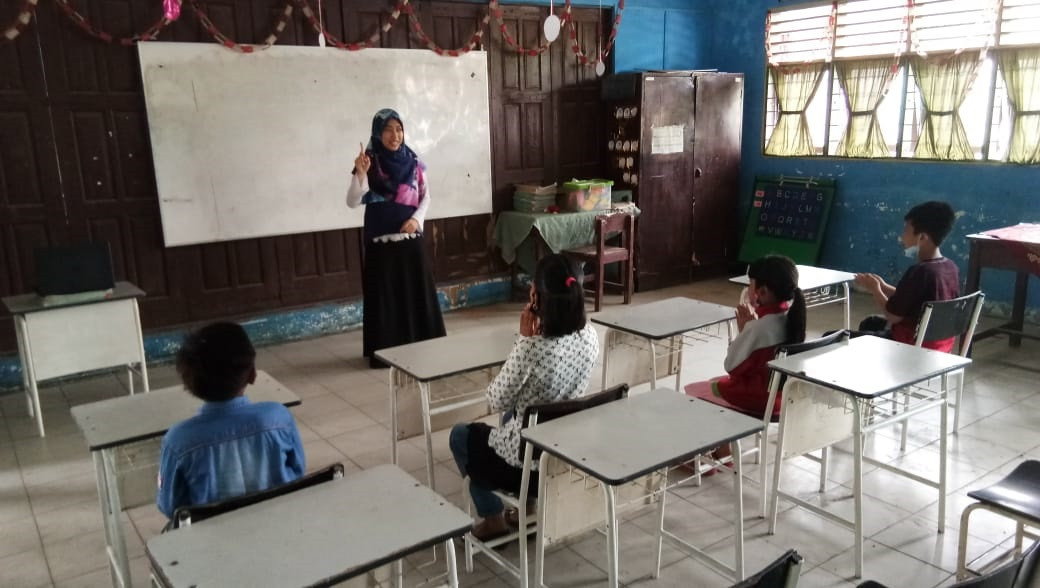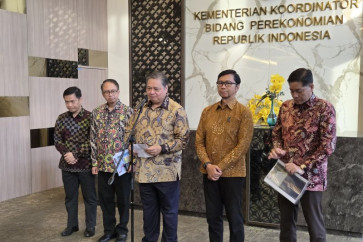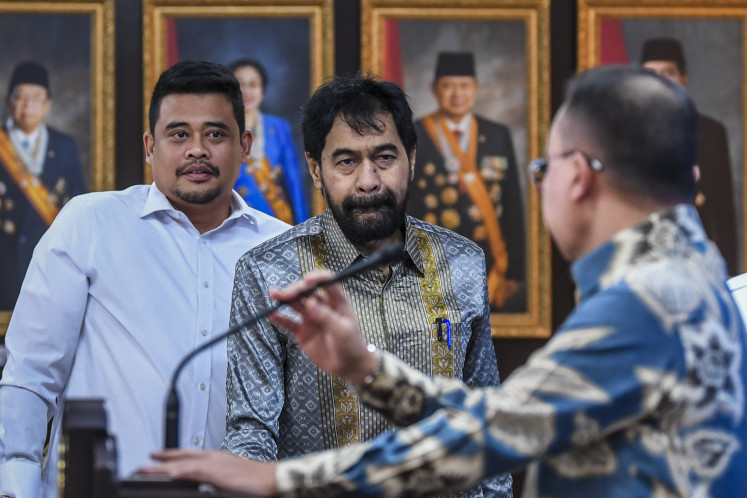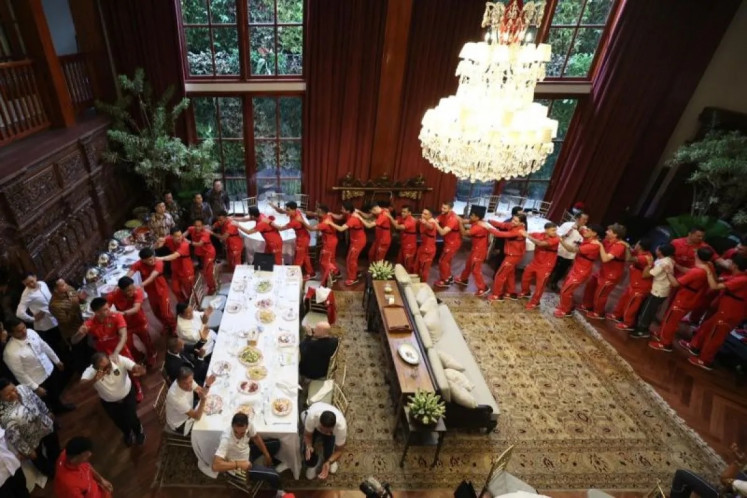Popular Reads
Top Results
Can't find what you're looking for?
View all search resultsPopular Reads
Top Results
Can't find what you're looking for?
View all search resultsFate of nonformal teachers in jeopardy, experts say
Nonformal teachers continue to be overlooked despite the nation's demand for more qualified teaching staff, education experts bemoan.
Change text size
Gift Premium Articles
to Anyone

A
mid the government’s push to recruit more civil servant teachers in combating the country’s lack of educational personnel, nonformal teachers, many of whom have served for years with minimum pay, are continuing the fight to be recognized as civil servants (PNS).
Such is the case for 50-year-old Sri Hariyati. Her 24 years of experience has yet to give her civil servant status, as she continues to be a nonformal teacher for her first and only school, Kademangan 01 state junior high school in Blitar regency, East Java.
After joining the school in 1997, Sri had initially hoped that one or two years of diligent service would grant her wish to become a civil servant teacher.
“Back then, to become a PNS was not difficult. But in reality, it was far from what I had hoped. Until today, it’s been full of struggle [to become a PNS teacher],” Sri told the The Jakarta Post on Thursday.
Despite falling short of meeting the bar numerous times in the annual candidate civil servants (CPNS) recruitment, Sri refuses to give up hope.
Since the introduction of the Education, Culture, Research and Technology Ministry’s data center Dapodik in 2013, Sri had to go back and forth between the regional administration’s office and the ministry to obtain her teaching credentials, which she finally received in 2018 after 19 years of service.
Despite obtaining her certification, the work of a nonformal teacher has not gotten any lighter. Since the pandemic forced schools to close, Sri has struggled to make ends meet, as she would usually sell trinkets at school to cover for her inadequate wages.
“As a nonformal teacher, the regional [administration] pays me Rp 1 million. Even getting to that point was a long struggle. Initially, it was since 2012 only Rp 520,000 [per month].”
At her age, she realizes that she will not be able to join anymore civil servant intakes. She now hopes that her younger colleagues will continue the fight, as she eagerly waits for the government to “appreciate what nonformal teachers have brought to the table all this time”.
Sri is only one of the many cases where a nonformal teacher has lost an opportunity to become a civil servant. Notably, the government’s annual recruitment process only considers those below 35 years of age for appointment.
Despite numbering over 1.7 million individuals, or more than half of all the teachers in the country, nonformal teachers have long been overlooked, Indonesian Teachers Association (PGRI) secretary-general Dudung Abdul Qodir said on Wednesday.
“Most nonformal teachers are older than 35. Why? Because there has been a moratorium. It’s not their fault. We urge the government, [House of Representatives] members and the national leadership to understand that there hasn’t been any civil servant officiation for 10 years,” Dudung said during a hearing with House Commission X on Wednesday. [https://www.youtube.com/watch?v=L9D_mLRU5Q8 20:00]
According to Dudung, nonformal teachers often struggle to be included in the ministry’s Dapodik, as regional governments fail to provide them with the necessary documents.
Additionally, the government has also failed to give nonformal teachers adequate attention in their career development, as those who are supported are mostly civil servants teachers.
As such, he has urged the government, whether through the education ministry or the Administrative and Bureaucratic Reform Ministry, to revise the Civil Servants Law and to immediately officiate nonformal teachers above 35 years old as contract teachers (PPPK).
“Today, we have an emergency shortage of teachers. Together, let us focus on how to resolve the very urgent [issue of] managing our teachers, to meet the need in Indonesia immediately," he said.
-Problematic recruitment-
Previously, the Administrative and Bureaucratic Reform Ministry announced that as of June 13, the government had prepared 707,622 slots for the 2021 civil servants recruitment process.
[https://www.kompas.com/tren/read/2021/06/15/113300865/seleksi-segera-dibuka-berikut-syarat-umum-pppk-dan-pppk-guru-2021?page=all]
Of this number, most will be allocated for active nonformal and private teachers applying for a contract position, equal to over 500,000 slots.
This number, however, is only half of what Education, Culture, Research and Technology Minister Nadiem Makarim had promised in November last year, when he stated that 1 million slots were being prepared for teachers in the 2021 recruitment drive.
[https://nasional.kompas.com/read/2020/11/23/16234301/kemendikbud-buka-satu-juta-formasi-pppk-nadiem-kesempatan-guru-honorer-untuk]
On top of the quota being cut by half, critics have also been quick to point out that none of the promised 500,000 positions have been prepared to convert teachers into permanent civil servants.
Unlike civil servants, a contracted position is not employment on permanent terms and consequently does not provide access to numerous benefits, including a pension and retirement benefits.
House Commission X chairman Syaiful Huda slammed the decision, saying that teachers were more deserving to be prioritized for a civil servant position than ministerial employees.
"Teachers are not only required to be professional in their teaching fields, they are also required to be role models for their students. Therefore, the state deserves to guarantee their needs and welfare, so that teachers can educate and not just teach," Huda was quoted by kompas.com as saying.
[https://nasional.kompas.com/read/2021/05/31/10542301/tak-ada-slot-cpns-guru-2021-komisi-x-desak-perbaikan-pola-rekrutmen-asn?page=all]
According to Huda, the 2021 civil servant recruitment drive has introduced a number of problematic policies that might harm teachers’ welfare. This year’s recruitment is the first time in the nation’s history where teachers are not allowed to apply for a civil servant position.
As such, members of the Commission urged the government to prepare other mechanisms that are geared toward facilitating the formalization of nonformal teachers as civil servants.
Commission X vice chairwoman Hetifah Sjaifudian also stated that, along with other officiation mechanisms, there must also be intensive mentoring and training of nonformal teachers geared to help them meet the competency standards needed to become civil servant teachers.
“This is a form of appreciation for their services over the years. The qualifications that education personnel need may not be as complex as teachers, and this can be taught through training,” Hetifah said during a commission meeting on May 24.
[https://www.dpr.go.id/berita/detail/id/33013/t/Hetifah+Sarankan+Guru+Honorer+Senior+Diangkat+Menjadi+PNS+Tenaga+Kependidikan]
-Victims through and through-
Problems continue to pester nonformal teachers even in this year’s recruitment drive, as the funding for the recruitment of contract teachers is still being debated by the central and regional governments.
With the central government set to cover for the initial budget of salary and benefits, regional governments are concerned that the financial resources would be retracted indefinitely in the future, leaving local administrators to fund a hefty payroll to cover for themselves.
The Education and Teachers Association’s (P2G) national coordinator, Satriwan Salim, points out that nonformal teachers will ultimately be the only victims in this funding debate.
“The P2G urges the central government and local administrations to sit down and [align their] perception on the sources of salaries and allowances for contract teachers, including anticipating other potential problems that will arise in the future,” he said in a press release on Wednesday.
As a result of the uncertainty in funding, there is a large discrepancy between the number of contract positions prepared by regional administrations and those approved by the central government, leaving even fewer opportunities for nonformal teachers who hope to become contract teachers to take part in the recruitment process.
In regions such as the Karawang regency in West Java, only 660 positions are approved by the bureaucratic reforms ministry, despite local administrations having requested 1,080 contract teachers.
The case is even more severe in Garut and Cianjur regencies in West Java, as the ministry only approved a quota of just over 2 percent of what local administrators have requested.
On top of the government’s hesitance to recruit contract teachers and appoint nonformal teacher as civil servants, Satriwan said the situation only served to complicate the shortage of 1.3 million teacher in state schools.
“Contract teachers are a short term solution. The long term solution [is to appoint] civil servant teachers. We regret that the government will not open any slots for civil servant teachers [this year],” he said.
Officials from the education ministry were not immediately available for comment.









